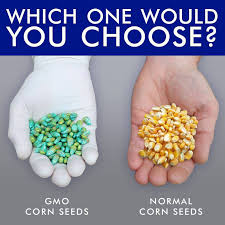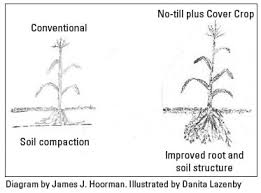I can’t even begin to tell you how many times I’ve been asked by my non-farming friends, “why do farmers use genetically modified or genetically engineered seeds?” Maybe it would be wise to, first, define the terms genetically modified or genetically engineered. According to Wikipedia, “Genetically modified foods or GM foods, also known as genetically engineered  foods, are foods produced from organisms that have had changes introduced into their DNA using the methods of genetic engineering. Genetic engineering techniques allow for the introduction of new traits as well as greater control over traits than previous methods such as selective breeding and mutation breeding.”
foods, are foods produced from organisms that have had changes introduced into their DNA using the methods of genetic engineering. Genetic engineering techniques allow for the introduction of new traits as well as greater control over traits than previous methods such as selective breeding and mutation breeding.”
Just a side note: Please do not be confused when you come across seeds labeled non-GMO seeds. As most farmers already know, there are no GMO vegetable plants for sale to garden growers. All vegetable seeds have and continue to be non-GMO crops. There are only eight crops commercially available as GMOs: corn, soybeans, papya, cotton, squash, canola, alfalfa and sugarbeets. GMO squash isn’t available for the backyard gardener, only on a commercial scale. Therefore, GMO vegetable seeds do not exist and are not available to backyard gardeners.
Now that we have taken care of any confusion and we are all on the same page with the definitions, let’s move on to an explanation for the use of genetically engineered seeds. Summit County Farm Bureau Trustee, Carol Bessemer was a “grain” farmer in Marion County for over 40 years. Currently, her son and daughter-in-law, John and Emily Buck, have taken over the running of the farm. This first-hand knowledge has given her daughter-in-law, Emily Buck, Ph.D., an associate professor in the College of Food, Agricultural, and Environmental Sciences at The Ohio State University, an excellent understanding of the use of genetically engineered seeds, which she shares in the article, below.
Emily Buck commentary: Genetic engineering improves crops, helps the environment
When you have a garden, you know you want the best seeds and the most nutrient-rich soil. You water your garden faithfully, weed, and hope for the best produce possible.
With farming hundreds of acres, you have the same requirements — just on a larger scale. However, with farming, there’s a lot more at stake than a home garden. Your livelihood and future lies in your fields. And especially in our area, the water quality of Lake Erie and well-being of others may benefit from farmers continuing to bridge toward technological advancements that help us care even more for the environment on and around our farms. So, protecting yields and the environment is top of mind, which is why farmers choose to plant genetically engineered crops.
To produce genetically engineered crops, scientists copy genes that have a desired trait in a certain plant to use in other plants.
According to a recent survey of farmers by U. S. Farmers & Ranchers Alliance and National Corn Growers Association, farmers believe people find pesticides (96%) and water usage (95%) to be consumers’ top concerns. Farmers reported that they grow genetically engineered crops as a way of addressing these concerns.
The majority of farmers said genetically engineered crops allow them to minimize pesticide and herbicide use, and over three-quarters chose genetically engineered crops in conjunction with practices such as conservation tillage, which promotes better water quality and soil health.
In no til l planting, the soil is left virtually undisturbed. Since the genetically engineered crops have weed- and pest-resistant traits, they do not need as much tillage to control the weeds and less pesticide is applied. Also, farmers are able to pinpoint their fertilizer application, knifing it into the soil to reduce runoff.
l planting, the soil is left virtually undisturbed. Since the genetically engineered crops have weed- and pest-resistant traits, they do not need as much tillage to control the weeds and less pesticide is applied. Also, farmers are able to pinpoint their fertilizer application, knifing it into the soil to reduce runoff.
Across other industries and businesses, scientific developments are celebrated. Yet, biotechnology used in agriculture is not always embraced by consumers, even though it allows farmers to be more productive and grow drought-resistant, chemical-resistant and bug-resistant crops, while conserving resources and lessening our environmental impact.
Ohio farmers are committed to continuous improvement. Back in 2014, because of algal blooms in Lake Erie, Toledo residents endured a three-day ban on drinking water that had been contaminated. The state’s response was the help reduce the amount of phosphate going to Lake Erie by 40 percent in the next decade. Part of the solution is testing farming practices, and genetically engineered crops help in this effort immensely.
My family farm grows about 1,000 acres of corn and soybeans, and we’ve been no till for 20 years, thanks in large part to this crop technology. It improves our water quality by curbing erosion and enhances soil health by reducing soil compaction. Also, when plants are resistant to pests, we don’t have to spray pesticide as frequently; so we’ve improved the quality and quantity of our crop, keeping our family and other families a priority. Our farmland also sits on the Lake Erie and Mississippi River watersheds, so where the water goes and maintaining soil compaction is a big deal for us.
As both a farmer and consumer, I can say we share similar values. We’re all interested in a safe product that benefits all of us. The marketing and discussions around genetically engineered crops often includes two sides, yet the underlying theme is unified. Farmers and consumers are in this together.
As for Ohio, we’ve seen the effects of the algal blooms, and we’re all interested in keeping our environment clean for future generations. Not only are we farmers, we’re also environmentalists and conservationists putting the environment first to help our crops thrive.
The original article appeared in The Columbus Dispatch on Thursday, January 12, 2017 and is reprinted with their permission.